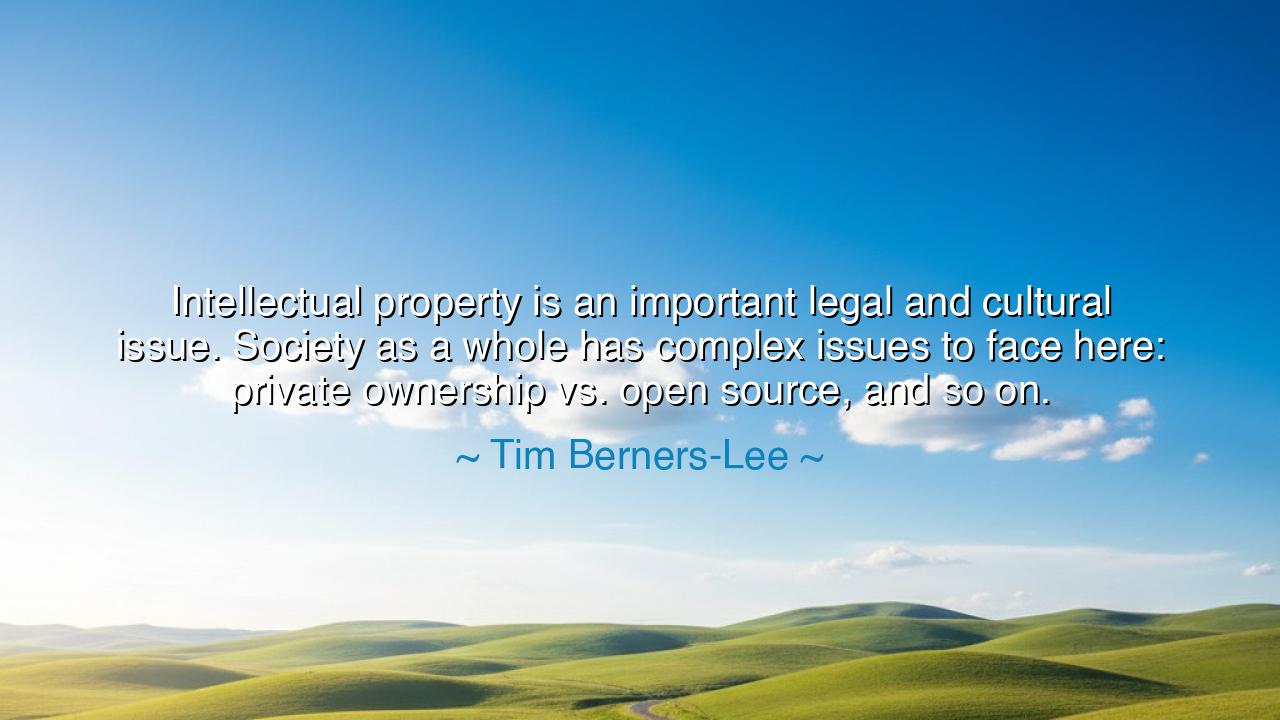
Intellectual property is an important legal and cultural issue.
Intellectual property is an important legal and cultural issue. Society as a whole has complex issues to face here: private ownership vs. open source, and so on.






Hear the words of Tim Berners-Lee, father of the World Wide Web, who proclaimed: “Intellectual property is an important legal and cultural issue. Society as a whole has complex issues to face here: private ownership vs. open source, and so on.” In these words lies not a simple statement, but a profound reflection upon the tension between the treasures of the mind and the sharing of those treasures for the good of humankind. For knowledge has always been both gift and power, and the way we choose to guard it—or release it—shapes the destiny of nations and peoples.
When he speaks of intellectual property, he speaks of the creations of thought: inventions, discoveries, writings, and designs, born not from the soil or the forge, but from the lightning of the mind. In ancient times, the poet, the philosopher, and the craftsman were honored for their gifts, but their work belonged to the community as much as to themselves. In our age, however, the question grows more urgent: shall the fruits of the mind be bound by locks and keys, or shall they be shared freely, like the sun’s light? This is the struggle between private ownership and open source, between profit and the collective good.
Consider the story of Johannes Gutenberg, who gave the world the printing press in the fifteenth century. His invention shattered the chains of knowledge that had been locked within monasteries and rare manuscripts. Books spread across Europe, and with them came literacy, reformation, and revolution. Yet even then, questions arose: who owned the right to copy a text, and who profited from the spread of knowledge? Gutenberg himself, though his invention changed the world, died in poverty. His story is a reminder that the guardianship of intellectual work must be carefully balanced, lest the creator be forgotten, or the world be deprived.
Tim Berners-Lee himself stands as another testament. He did not bind the web with chains of ownership, though he could have claimed it and become one of the richest men of his age. Instead, he gave it as a gift to humanity, free and open, so that millions might connect, learn, and create. Yet even as the web grew into a boundless sea of ideas, new struggles arose: corporations sought to claim pieces of it, to fence off what was meant to be open, to profit from what was meant to flow. Here lies the eternal paradox: too much ownership, and knowledge is stifled; too little, and the creator may wither without reward.
The meaning of this teaching is clear: society must wrestle with complex issues that touch both justice and survival. If all is private, then knowledge becomes a weapon of the few, and inequality deepens. If all is open, then the laborer of the mind may find no sustenance for their craft, and innovation may falter. Thus, the wise must walk a middle path, where creation is honored, but access is not denied; where ownership rewards effort, but openness nurtures growth.
The ancients remind us of this balance. In Athens, playwrights and philosophers shared their works in the agora, giving wisdom freely to the people. Yet patrons and city leaders supported them, ensuring that their voices did not fall silent for lack of bread. In this model lies a lesson for our age: reward the creator, but keep the gates of knowledge open to all who seek it. For to hoard the fruits of the mind is to dim the lamp of civilization; to scatter them without care is to let the flame sputter in the wind.
What, then, must you, listener, carry into your own life? Be mindful of how you use the gifts of others. Honor creators by supporting their labor, yet also defend the principle of open knowledge, that future generations may learn and build upon the past. Choose tools and works that uplift the commons, not only those that enrich the powerful. Teach your children to see knowledge not as a possession alone, but as a sacred trust to be shared with wisdom.
Let Berners-Lee’s words resound like an ancient oracle: society’s greatness lies in how it handles the treasures of the mind. Walk, then, with reverence for both the rights of the creator and the needs of the world. Guard against greed that would bind the flow of knowledge, and guard also against neglect that would leave the creator unrewarded. In this balance lies the true flourishing of culture, innovation, and the future of humankind.






AAdministratorAdministrator
Welcome, honored guests. Please leave a comment, we will respond soon